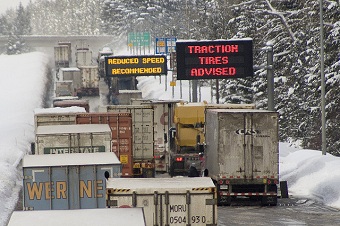How much would a smarter supply chain increase profits?
 The systems we have in place for moving products to consumers are largely inefficient.
The systems we have in place for moving products to consumers are largely inefficient.If we look closely at the transportation industry, for instance, about three-fourths of manufacturers or retailers transport their own goods rather than combining logistics between carriers, manufacturers, and retailers. This inefficiency leads to truck-trailers that are 60 percent full, according to the United States Department of Transportation, and one in five trips in which a trailer is completely empty.
A new study by engineers at the University of Arkansas and Virginia Tech University found that these inefficiencies could be greatly reduced though a concept known as the Physical Internet, “in which goods are handled, stored and transported in a shared network of manufacturers, retailers and the transportation industry.” The researchers determined that if just 25 percent of U.S. companies participated in this smarter, interconnected supply chain, the participating companies would see their combined profits increase by $100 billion. But it wouldn’t just help the bottom line, carbon dioxide emitted from road-based freight would decrease by 33 percent. And the best part of all this? Consumers pay less.
Here’s more on what this more efficient system would look like:
As a potential solution, the Physical Internet proposes an efficient system in which global supply-chain logistics are enabled by an open, intermodal (transportation by land, rail, ship or barge) system that uses standard, modular and re-usable containers, real-time identification and coordinated routing through shared logistics facilities. In other words, all supply-chain stakeholders – manufacturers, transportation providers and retailers – act independently to use a shared logistics network that increases the size of trailer loads and reduces or eliminates miles traveled by empty trailers.
“The technology to make this happen is currently available,” said Russ Meller, professor of industrial engineering at the University of Arkansas. “All parties, including the consumer, will benefit. Now we need industry partners to pilot a mini-Physical Internet and allow us to share those results with others in the industry.”
You can return to the main Market News page, or press the Back button on your browser.

